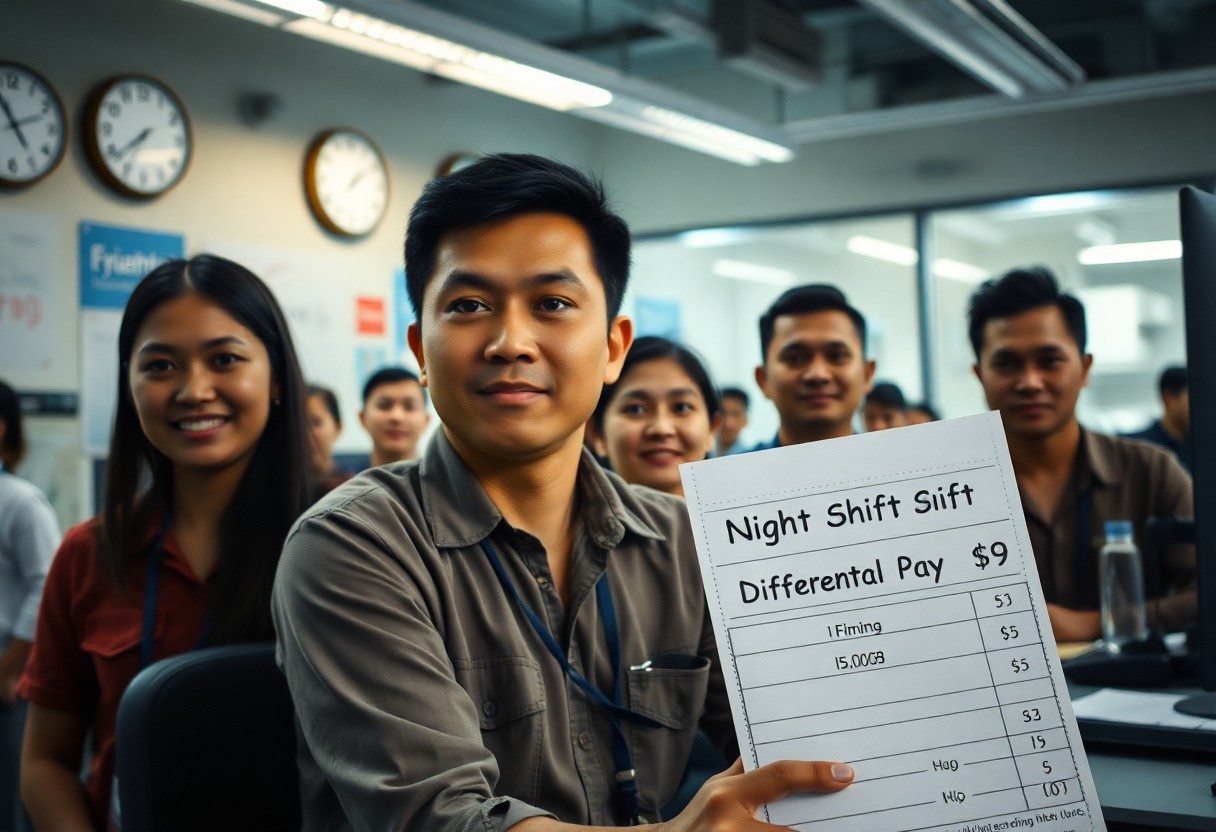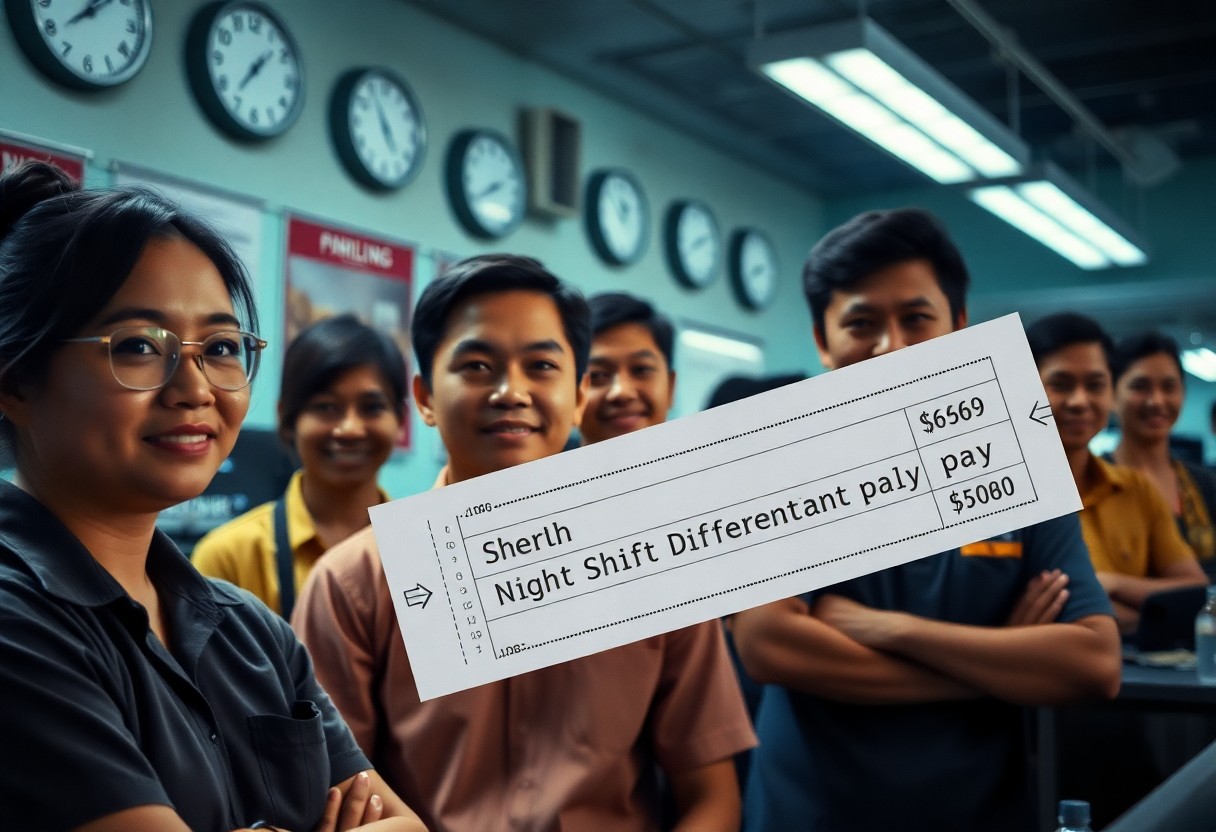Night work involves unique challenges that affect your health and well-being, which is why the Philippines mandates Night Shift Differential (NSD) Pay to compensate employees working between 10:00 PM and 6:00 AM. If you are an employee or employer, understanding the legal requirements, eligible workers, and computation rules is imperative to ensure compliance and protect your rights. Failure to provide this benefit may result in serious legal consequences. Learn the basics and finer details of NSD to confidently manage or claim this entitlement. For an in-depth discussion, see Night Differential Pay in the Philippines: 2025 Guide ….

Key Takeaways:
- Night Shift Differential (NSD) pay in the Philippines is a mandatory benefit requiring employers to pay an additional 10% of the employee’s regular wage for work performed between 10:00 PM and 6:00 AM, as mandated by Article 86 of the Labor Code.
- The NSD applies primarily to rank-and-file employees under various employment statuses, while certain groups such as managerial staff and government employees may be exempt unless covered by company policies or Collective Bargaining Agreements.
- NSD pay is separate and distinct from overtime, holiday, or premium pays. Employers must comply with NSD rules to avoid legal sanctions, as labor standards related to differential pay cannot be waived.
Night Shift Differential Pay in the Philippines: What Every Employee and Employer Must Know
In the Philippine labor system, employees who work during late-night hours are entitled to specific compensation known as Night Shift Differential (NSD) pay. This provision exists to acknowledge the challenges and potential health effects associated with working graveyard shifts.
What is Night Shift Differential Pay?
NSD pay refers to the additional 10% compensation on top of an employee’s regular hourly wage for work performed between 10:00 PM and 6:00 AM. This rate is stipulated under Article 86 of the Labor Code, ensuring that employees receive fair remuneration for working during less desirable hours.
Who is Eligible?
The main beneficiaries of NSD pay are rank-and-file employees, including those permanently employed, probationary, or on a contractual basis. However, certain groups like managerial employees, government workers, or field personnel might not be covered unless they are explicitly included through company regulations or collective bargaining agreements.
Separate from Other Pay
It is important to note that NSD pay is computed separately from other types of compensation such as overtime, holiday, and premium pay. If an employee’s shift overlaps with these conditions, the pay for each is calculated independently but can accumulate accordingly.
Employer Obligations and Legal Implications
Compliance with NSD laws is not optional. Employers who fail or refuse to pay the mandated differential risk administrative penalties and labor claims. Philippine labor courts and the Department of Labor and Employment (DOLE) consistently uphold these standards to protect worker rights.
Practical Advice
For employees, understanding their right to NSD pay helps ensure their compensation fairly reflects the hours they work. For employers, maintaining compliance avoids legal disputes and fosters a respectful workplace environment.
NSD pay is a fundamental aspect of Philippine labor law aimed at balancing productivity needs with employee welfare during night shifts. Both employees and employers should be aware of the rules and responsibilities surrounding this benefit.

The Framework of Night Shift Differential Pay
The framework of Night Shift Differential (NSD) pay in the Philippines is anchored firmly on statutory provisions that ensure fair compensation for work done during late-night hours. Article 86 of the Labor Code specifically outlines the conditions, rate, and coverage of NSD, reinforcing the right of rank-and-file employees to receive at least 10% additional pay during the defined night shift period. Employers must navigate this legal framework carefully, understanding which employees qualify and the mandatory nature of this benefit, which cannot be waived or replaced by other forms of compensation.
Defining Night Shift Differential Under Article 86 of the Labor Code
Article 86 explicitly mandates that employees working between 10:00 PM and 6:00 AM receive a Night Shift Differential pay of not less than 10% of their regular hourly wage. This provision applies primarily to rank-and-file workers, covering permanent, probationary, and contractual employees. Importantly, this differential is a statutory entitlement and must be paid regardless of whether it is written into the employee’s contract, safeguarding workers’ rights during graveyard shifts.
Key Timeframe: Establishing the 10:00 PM to 6:00 AM Standard
The NSD pay applies strictly to work done between 10:00 PM and 6:00 AM. This eight-hour window reflects the period when workers experience the greatest disruption to normal sleep patterns and circadian rhythms, justifying the additional compensation. The law does not allow employers to shorten or alter this timeframe, ensuring consistent protection for employees across industries.
Work shifts extending into or overlapping this timeframe require precise calculation to determine how many hours qualify for NSD pay. For example, if you work from 9:00 PM to 5:00 AM, only the hours from 10:00 PM to 5:00 AM are eligible, amounting to 7 hours subject to differential pay. This standardization protects employees from underpayment and obligates employers to monitor actual hours worked carefully to comply with labor laws.
Eligibility Criteria for Night Shift Differential
Eligibility for Night Shift Differential (NSD) in the Philippines generally covers rank-and-file employees working between 10:00 PM and 6:00 AM, entitling them to at least 10% additional pay per hour. NSD applies across employment statuses—whether permanent, probationary, or contractual—and remains mandatory regardless of contract terms. Your entitlement activates the moment you perform work during the specified hours, reflecting government efforts to offset the disruptions graveyard shifts impose on health and lifestyle.
Who Qualifies: Rank-and-File vs. Managerial Employees
NSD pay primarily benefits rank-and-file employees, including those on probation or temporary contracts. Managerial employees typically fall outside this scope, unless your company policy or a Collective Bargaining Agreement explicitly includes them. Positions deemed to have supervisory authority often forfeit NSD since their roles theoretically involve higher compensation and different working conditions, but this does not apply universally—you should verify your status if you believe NSD should apply.
Clarifying Exemptions in Various Employment Sectors
Certain sectors such as government workers, field personnel, or managerial staff are commonly exempt from NSD pay, depending on existing company policies or collective agreements. The Labor Code leaves room for these exclusions, but some labor tribunals have ruled that such exemptions must be clearly stipulated and cannot be arbitrarily enforced. If you work in a sector where exemptions are claimed, confirm if your employment terms or workplace agreements expressly exclude NSD rights.
Beyond rank distinctions, exemptions in various sectors depend heavily on formal documentation and agreements. For example, government employees generally do not receive NSD unless their agency policy states otherwise, while field personnel—who often work outside standard office settings—may also be excluded unless covered by contractual clauses. Collective Bargaining Agreements can override general rules, introducing either broader coverage or stricter exemptions. Your eligibility hinges on these nuances, which means reviewing your employment contract, company policies, and any union agreements is necessary to assert your precise entitlement.
Calculating Your Night Shift Differential: A Practical Guide
Calculating your night shift differential (NSD) starts with identifying the hours worked between 10:00 PM and 6:00 AM, then applying the mandated 10% additional pay to your regular hourly wage. This means for each hour worked during the covered period, you receive an extra 10% on top of your base pay. Understanding this calculation ensures you get accurate compensation and helps you track whether your employer complies with NSD regulations. Keep in mind, NSD is paid beyond basic salary and is separate from overtime or holiday premiums.
Understanding the Computation Formula
The NSD amount equals 10% of your regular hourly wage multiplied by the number of hours worked during the night shift window. To illustrate: if your daily wage is ₱500 and you work 8 hours, your hourly rate is ₱62.50; thus, the night shift differential for one hour is ₱6.25 (10% of ₱62.50). Working 4 hours at night means you earn ₱25 extra as NSD. This formula applies consistently across wage levels but must reflect your precise salary for accurate computation.
Real-World Examples: How It Applies to Minimum Wage Scenarios
Assuming you earn the daily minimum wage in Metro Manila, which is ₱570, your hourly rate is roughly ₱71.25. For each hour you work during the NSD hours, you’re entitled to an extra ₱7.13. If you have a regular 8-hour night shift fully within the 10 PM to 6 AM period, your NSD pay alone totals approximately ₱57 per day, adding up significantly over a month.
For example, a minimum wage earner working a full 8-hour night shift every workday in a 22-day month will receive around ₱1,254 in NSD pay. This additional income supplements your base salary without replacing overtime or holiday pay, ensuring your compensation fairly accounts for the challenges of night work. Employers are legally bound to calculate this precisely, which safeguards your rights as a night shift worker and supports fair labor standards.
The Legal Imperative of Night Shift Differential: Employer Obligations
Your obligation to pay night shift differential (NSD) under Philippine labor law cannot be ignored or waived, as it is a mandatory employee benefit stipulated by Article 86 of the Labor Code. Regardless of company policies or employment contracts, you must provide at least a 10% premium on the regular hourly wage for work performed between 10:00 PM and 6:00 AM. Failure to comply exposes you to possible sanctions, labor complaints, and damages claims, reinforcing that NSD is a non-negotiable part of employee compensation when night work is required.
Mandatory Compliance Even in the Absence of Company Policy
Even if your company policy or employment contract does not explicitly mention night shift differential pay, you are legally required to grant this benefit to eligible employees. Labor standards in the Philippines cannot be set aside by company silence or employee agreement. The law clearly mandates NSD pay, making compliance independent of internal rules or negotiated terms, ensuring protection for rank-and-file workers, including probationary and contractual employees.
Enforcement Mechanisms: The Role of DOLE and Notable Case Law
The Department of Labor and Employment (DOLE) enforces NSD regulations through inspections, audits, and the resolution of employee complaints. DOLE’s strict stance is evident in recent rulings supporting employee claims for unpaid NSD, emphasizing that labor standards must be upheld without exception. Companies found in violation face administrative sanctions and compulsory payment orders, reinforcing the imperative to fulfill this legal obligation consistently.
The DOLE regularly conducts workplace inspections focused on compliance with wage laws, including NSD payments. For instance, in the landmark case of Volante vs. NLRC, the Supreme Court upheld the employee’s entitlement to NSD despite the employer’s argument that night work hours were irregular and unspecified in employment contracts. This ruling affirms that night shift differential cannot be waived or ignored, even in ambiguous employment arrangements. Non-compliance also triggers administrative fines and may affect your company’s reputation, as DOLE can issue compliance orders and impose penalties. The combined weight of these mechanisms ensures that employers approach NSD pay not as an optional bonus but as a mandatory labor standard with legal consequences.

The Constraints of Waiving Night Shift Differential Benefits
Night Shift Differential (NSD) benefits cannot be waived by employees, whether through contracts or agreements, as these benefits are protected under the Labor Code. Even if you sign an employment contract that omits NSD, the law automatically ensures your entitlement. This safeguard upholds workers’ welfare by guaranteeing that the additional compensation for night work remains non-negotiable and mandatory. Employers must comply regardless of internal policies or mutual agreements, as any waiver attempts are considered null and void under prevailing labor jurisprudence and Department of Labor and Employment (DOLE) rulings.
Dissecting the No Waiver Rule: Labor Standards Are Non-Negotiable
The Labor Code explicitly states that labor standards, including NSD, are non-waivable privileges designed to protect workers from exploitation. If you work between 10:00 PM and 6:00 AM, your entitlement to at least 10% of your regular wage per hour stands firm regardless of employer objections. This principle prevents companies from circumventing NSD requirements through contractual clauses or informal agreements, ensuring that your rights remain intact and enforceable by law.
Recourse for Non-Payment: Navigating Complaints Through DOLE or NLRC
If your employer fails to pay the legally mandated NSD, you can file a complaint with the Department of Labor and Employment (DOLE) or the National Labor Relations Commission (NLRC). These agencies investigate claims, facilitate settlements, or adjudicate disputes with binding decisions. You may present time records and wage slips as evidence to support your claim, and successful cases often result in back payment of NSD plus possible penalties against the employer for non-compliance.
Taking action through DOLE or the NLRC involves submitting a written complaint outlining the non-payment issue, supported by your work schedules and payroll documents. DOLE typically conducts inspections or conciliation efforts first, seeking amicable resolutions between you and your employer. If unresolved, cases escalate to the NLRC, where formal hearings determine obligations based on labor laws and jurisprudence. Being aware of these channels empowers you to assert your rights effectively and ensures that employers uphold their legal responsibilities under Philippine labor standards.
Enhancing Employee Welfare: Beyond Night Shift Differential
Offering night shift differential pay recognizes the unique challenges faced by graveyard shift workers, but enhancing welfare goes further by addressing their wellbeing comprehensively. Providing health programs, flexible scheduling, and rest areas helps mitigate the physical and mental stresses caused by nighttime work. Some progressive employers in the Philippines also offer transportation subsidies and meal allowances to improve safety and convenience. These measures reduce fatigue and boost morale, fostering a more engaged and healthier workforce beyond the legal compensation minimum.
Comparing Night Shift Differential with Overtime Pay and Holiday Premiums
| Night Shift Differential | Overtime Pay & Holiday Premiums |
|---|---|
| Compensates work between 10:00 PM and 6:00 AM with a minimum 10% wage increase per hour. | Overtime pay applies when work exceeds normal hours, usually at 25% or higher premium; holiday premiums increase pay on special holidays, typically 30% or more. |
| Applies mainly to rank-and-file employees regardless of contract type. | Overtime and holiday premiums typically apply to all eligible employees, including rank-and-file and non-managerial staff. |
| NSD pay is legally mandated and separate from overtime or holiday pay but can overlap. | Overtime and holiday pay premiums are calculated independently and can be combined with NSD when applicable. |
Additional Benefits for Night Shift Employees: Best Practices for Employers
Beyond compliance with NSD, employers enhance workforce stability by adopting additional incentives such as health screenings, fatigue management workshops, and access to counseling services specifically for night shift workers. Providing well-lit and secure transportation options and designated rest areas shows commitment to employee safety and comfort. These benefits improve retention and productivity by addressing the broader lifestyle challenges imposed by night work schedules.
Many companies successfully implement wellness programs targeting circadian rhythm disruptions caused by night shifts. Examples include offering vitamin supplements, timed meal breaks, and partnering with local clinics to deliver on-site health checks. Regularly reviewing shift rotations to prevent excessive consecutive night work also helps in maintaining employee energy and alertness. Such proactive strategies demonstrate a holistic approach to night shift welfare, which can translate to lower absenteeism and stronger labor relations.
Final Thoughts
Night Shift Differential Pay ensures you receive at least 10% additional compensation per hour for work between 10:00 PM and 6:00 AM, safeguarding your rights under the Labor Code. Even if your employment contract doesn’t mention it, employers are legally required to pay this benefit. Non-compliance risks penalties and labor disputes, with DOLE consistently upholding these standards. Whether you’re a rank-and-file employee or managing a workforce, understanding the interplay between NSD and other premium pays—like overtime or holiday pay—is necessary. For a deeper explore its legal framework and practical applications, check out this comprehensive Night Differential Pay Policy Labor Law commentary.
Night Shift Differential Pay in the Philippines: What Every Employee and Employer Must Know
Night Shift Differential (NSD) pay is a mandated benefit under Article 86 of the Labor Code of the Philippines designed to compensate workers who perform work during the late-night hours of 10:00 PM to 6:00 AM. This provision acknowledges the unique challenges and potential health impacts connected with working graveyard shifts. Understanding the NSD guidelines is important for both employees and employers to ensure compliance and fair compensation.
Legal Basis and Coverage
The Labor Code clearly states that employees working between 10:00 PM and 6:00 AM must be paid an additional amount equivalent to not less than 10% of their regular hourly wage for each hour rendered during this period. This benefit covers rank-and-file employees, regardless of whether they are permanent, probationary, or contractual. However, managerial employees, government personnel, and certain field workers may be excluded unless their employment terms or company policies specifically grant NSD.
Calculation of Night Shift Differential
To compute NSD pay, multiply the employee’s regular hourly wage by 10% and then by the number of hours worked during the covered period. This additional pay is separate and distinct from overtime pay, holiday pay, or other premium pays. If an employee works during periods that overlap with these other conditions, the NSD pay is computed independently to ensure proper compensation.
Employer Obligations and Employee Rights
Employers are legally required to comply with NSD regulations regardless of whether the obligation is explicitly mentioned in employment contracts. Failure to pay NSD may result in administrative penalties or labor claims. The Department of Labor and Employment (DOLE) enforces these provisions through inspections, and labor courts consistently uphold workers’ rights to receive NSD. It is important for companies to establish clear policies and for employees to understand their entitlements regarding night shift work.
FAQ
Q: Who is entitled to Night Shift Differential pay in the Philippines?
A: Rank-and-file employees who work between 10:00 PM and 6:00 AM are entitled to NSD pay as mandated by the Labor Code. This includes permanent, probationary, and contractual employees. However, managerial employees, government workers, and certain field personnel are generally excluded unless company policy or a Collective Bargaining Agreement extends NSD benefits to them.
Q: How is Night Shift Differential pay computed?
A: NSD pay is computed by taking 10% of the employee’s regular hourly wage and multiplying it by the number of hours worked during the designated night shift period (10:00 PM to 6:00 AM). For example, if an employee’s hourly wage is ₱100 and worked 4 hours during the night shift, the NSD pay would be ₱100 x 10% x 4 hours = ₱40.
Q: Can NSD pay be combined with overtime or holiday pay?
A: Yes. NSD pay is a separate benefit and can be combined with overtime pay, holiday pay, or premium pay if the employee works during multiple premium periods. The computation for each type of pay should be done independently to ensure that the employee receives full and fair compensation for all applicable conditions.




